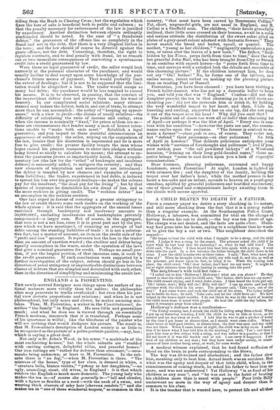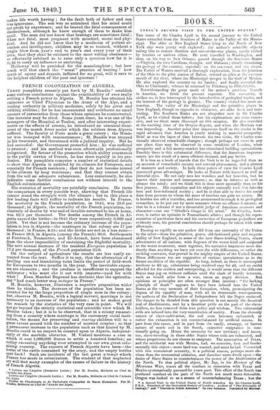A CHILD BEATEN TO DEATH BY A FATHER.
FROM a country paper we derive a story shocking in its nature, and still more shocking from the fact that it is a strong rather than a singular example. At the Southampton Police Court, Holloway, a labourer, was committed for trial on the charge of having beaten his son to death ;—the boy was ten years of age. The charge was not denied, and the facts are quite clear. Hollo- way had gone into his house, saying to a neighbour that he want- ed to give the boy a cut or two. This neighbour described the sequel— "He began to beat the child with what I thought to be a strap, and the child cried. I judge it was a strap by the sound. The prisoner asked the child if he knew what he had beat him for yesterday? or, what he had told him? The child said, `No, father.' I then heard him beat him again with a strap. I went down into the yard. In a few minutes the father brought the child down in his arms. I saw the child breathe two or three times. I said, ' Tom, what have you been at?' When he brought down the child, my wife took it, and she, as well as the prisoner, put water upon its face, to bring it to. When the beating took place, the child cried, ' Oh ! dear father, don't beat me any more.' It might be six or eight minutes from the first beating to coming into the yard."
The neighbour's wife told her tale— "I called out to him Holloway ! Holloway ! what are you about?' He then ceased to beat the child ; and the child said, 'Oh! father, don't beat me any more!' The child ceased crying, and I went down stairs. I then heard the little girl say, ' Oh father, don't; Billy will die! Billy will die!' I ran up stairs and met the prisoner with the child in his arms. The prisoner said, Take care, out of the way!' I got some water, and took the child out of his arms. The father helped me to bathe its face; he said, Take care, and let the child have air.' We have lodged in the house eight months. I do not think he was in the habit of beating the child more than is usual with people. He beat the child the day before, be- cause it remained away from school.'
Holloway's defence was a confession— "On Friday evening last, I struck the child for biding away from school. When I got up on Saturday morning, I told the child he was to bide at home, as his mother and me was away at work. I told him he was to get a pitcher of water by the time I got home at dinner-time, as I should want some coffee. When I came home at half-past twelve, at dinner-time, the door was open and the child was not there. When I came home at night, the child was in my room. I asked him if he knew what I had told him in the morning? he said, Yes '; and then I gave him four or five stripes with a strap, and was rather in a passion, so that I did not know if it was the buckle end or not. I am sorry it happened. I ant fond of my children as any man ; but they have been rather unruly, in conse- quence of their mother being away, at work, for some weeks."
A medical witness explained, that he had found suffusion of blood on the brain in parts corresponding to the blows. The boy was ill-trained and disobedient ; and the father slew him, meaning only to beat him. Actual death was an accident. But what was the agony and despair of that little child, when, in the consciousness of coming death, he asked his father to beat him no more, and was not understood Yet Holloway "is as fond of his children as any man "; and "he was not in the habit of beating his children more than is usual with people." Poor little Billy underwent no more in the way of agony and despair than is common to his class.
It is the teacher that is wanted here, to protect life and ailed
makes life worth having ; for the fault both of father and son was ignorance. The son was so untrained that his mind could not profit by experience; and he braved the fatal consequences of disobedience, although he knew enough of them to make him quail. The man did not know that beatings are sometimes fatal ; when not fatal, most pregnant with mischief, moral and phy- sical. And he did not know that by a modicum of patient at- tention and intelligence, children may be so trained, without a single blow from year's end to year's end every year of their lives, that they shall be subdued to the most willing obedience— so effectually subdued as to raise only a question how far it is right to carry an influence so enslaving.
Holloway will be punished for the manslaughter ; but how much will that check the " usual" practice of beating 'I how much of agony and despair, inflicted for no good, will it save to the helpless children of the poor and ignorant ?



























 Previous page
Previous page